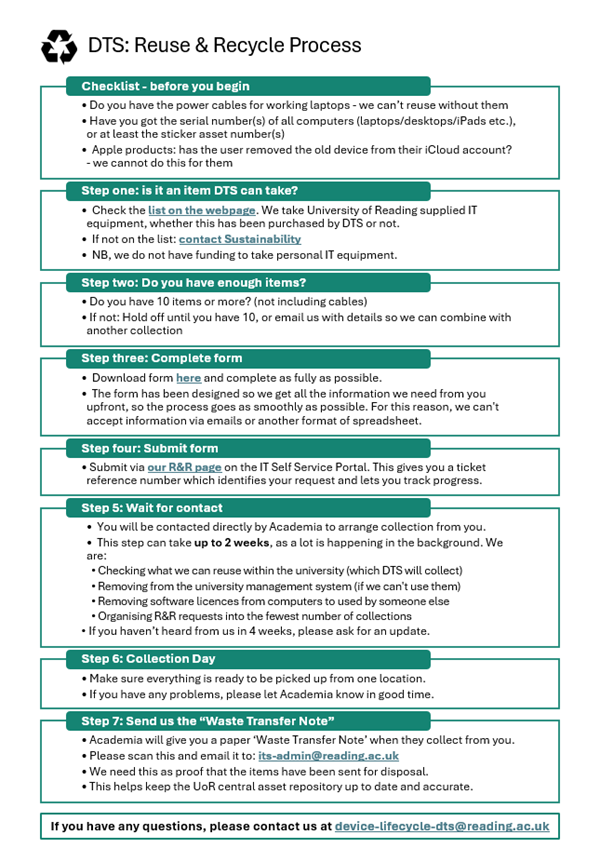Reuse & Recycle (R&R) Service
 This is a free of charge IT collection, reuse, and recycling service overseen by the Device Lifecycle team.
This is a free of charge IT collection, reuse, and recycling service overseen by the Device Lifecycle team.
All departments can request the collection of unwanted working or non-working IT equipment such as desktop computers, laptops, tablets, monitors, docks, cables and IT peripherals. This equipment will be treated as a potential asset either for reuse within the University or for sale through our recycling partner.
Any surplus value from the sale of equipment (after collection and any recycling costs) will be returned to the university into the Device Lifecycle work which offers a free of charge Microsoft Surface device to all eligible staff. Equipment that is not able to be re-used or sold will be recycled in accordance with environmental legislation for electrical equipment.
Note: The disposal of non-IT waste will remain within the realms of the existing Estates process; collection and disposal charges will apply. Use the Estates disposal request form for non IT equipment.
What is the process?
Click here to download a copy of the process diagram (with active links).

Where do I find the Reuse & Recycle form?
Download the form here: Reuse and Recycle Form (note that this will download an Excel spreadsheet .xlsx into your local Downloads folder). Please provide the asset tag/serial number of any computers or data holding devices, and the quantities of other items such as monitors. Only devices holding data need to have a serial number included. We ask for asset tag/serial numbers as devices need to be deregistered from systems and marked as reused or recycled. Part of the wider R&R service is ensuring comprehensive compliance and governance of university assets, and especially network devices.
Where do I send my completed Reuse & Recycle form?
Upload your finished form to the IT Self Service Portal using this link, Hardware - reuse & recycle. This will give you a unique reference number and enable you to track your order through the IT Self Service Portal.
What do we take?
This table shows what we can and can't take as part of the free of charge service. It is not exhaustive, so if you have any questions about whether we can accept something, please contact the Device Lifecycle team.
| Included | Not included |
| Desktop computers (Windows or Mac*) | Mobile phones (return to IT Admin) |
| Laptops (Windows or Mac*) and their chargers | Landline phones (BT) |
| Monitors | Personal devices and IT equipment |
| External hard drives | Packaging from new equipment |
| Accessories: mice, keyboards, docks | Mouse mats, wrist rests, laptop risers |
|
Headsets and speakers |
Cables for non IT equipment (e.g. kettles) |
| Cables and power supplies for IT equipment |
If you need to dispose of IT equipment, please read the IT Equipment Disposal Policy beforehand.
*Important note about Macs
If you are returning a Mac, whether for reuse in the University or for recycling, please ensure that you have logged out of your iCloud account before you return it.
Frequently Asked Questions
Please have a read through the frequently asked questions page for more supporting information.
Further information and contact
Email: device-lifecycle-dts@reading.ac.uk and we will be happy to help.
Page updated lm920207 on 22/09/25
